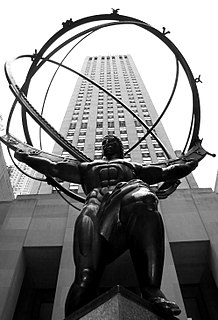A Quote by Andrew Bernstein
Altruism demands that an individual serve others, but doesn’t stipulate whether those others should be one’s family, or the homeless, or society as a whole. Collectivism states that, in politics, society comes first and the individual must obey. Collectivism is the application of the altruist ethics to politics.
Related Quotes
Collectivism holds that the individual has no rights, that his life and work belong to the group (to "society," to the tribe, the state, the nation) and that the group may sacrifice him at its own whim to its own interests. The only way to implement a doctrine of that kind is by means of brute force - and statism has always been the poltical corollary of collectivism.
Individual versus group selection results in a mix of altruism and selfishness, of virtue and sin, among the members of a society. If one colony member devotes its life to service over marriage, the individual is of benefit to the society, even though it does not have personal offspring. A soldier going into battle will benefit his country, but he runs a higher risk of death than one who does not. An altruist benefits the group, but a layabout or coward who saves his own energy and reduces his bodily risk passes the resulting social cost to others.
Peace must first be developed within an individual. And I believe that love, compassion, and altruism are the fundamental basis for peace. Once these qualities are developed within an individual, he or she is then able to create an atmosphere of peace and harmony. This atmosphere can be expanded and extended from the individual to his family, from the family to the community and eventually to the whole world.
The three values which men had held for centuries and which have now collapsed are: mysticism, collectivism, altruism. Mysticism — as a cultural power — died at the time of the Renaissance. Collectivism — as a political ideal — died in World War II. As to altruism — it has never been alive. It is the poison of death in the blood of Western civilization, and men survived it only to the extent to which they neither believed nor practiced it.
But the individual was not a tool for something. He was the maker of tools. He was the one who must build. Even for the best purpose it is criminal to turn an individual into simply a means for some ultimate end. A society in which the dignity of the individual is destroyed cannot hope to be a decent society.
At the heart of that western freedom and democracy is the belief that the individual man...is the touchstone of value, and all society, all groups, and states, exist for that person's benefit. Therefore the enlargement of liberty for individual human beings must be the supreme goal and the abiding practice of any western society.
Sometimes we feel that one individual's action is very insignificant. Then we think, of course, that effects should come from channeling or from a unifying movement. But the movement of the society, community or group of people means joining individuals. Society means a collection of individuals, so that initiative must come from individuals. Unless each individual develops a sense of responsibility, the whole community cannot move. So therefore, it is very essential that we should not feel that individual effort is meaningless- you should not feel that way. We should make an effort.
If a man speculates on what 'society' should do for the poor, he accepts thereby the collectivist premise that men's lives belong to society and that he, as a member of society, has the right to dispose of them...that psychological confession reveals the enormity of the extent to which altruism erodes men's capacity to grasp the concept of rights or the value of an individual life.
Among other grand achievements, F. A. Hayek had a remarkable career pointing out the flaws in collectivism. One of his keenest insights was that, paradoxically, any collectivist system necessarily depends on one individual (or small group) to make key social and economic decisions. In contrast, a system based on individualism takes advantage of the aggregate, or 'collective,' information of the whole society; through his actions each participant contributes his own particular, if incomplete, knowledge-information that could never be tapped by the individual at the head of a collectivist state.
Society is made up of individuals. The thoughts and actions of each individual influence the culture of that society. Instead of waiting for others to improve, we should try to improve ourselves. Once our attitude has changed, we will be able to perceive goodness throughout world. If there is a positive change in us, it will also be reflected in others. It is only what we give that we can hope to get back.




































